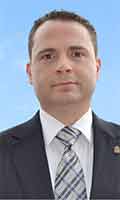Dr. Jeremy W. Francis uses research to help first responders better prepare for disaster.

Dr. Jeremy W. Francis.
The mood was somber in the squad room of the small-town police department the night of 9/11. The officers were thinking about the lives lost. Dr. Jeremy W. Francis ’12 was thinking about that too—and something else. A police officer at the time, Francis wondered how he and his colleagues would respond if a terror attack occurred in their Kentucky town. He realized that his fellow officers, emergency responders, and local officials were simply not prepared.
“It would have been mass chaos,” he says. “How could we keep people safe, control the situation, and respond to more threats without the right kind of preparation?”
Fast-forward two years to 2003. Francis is working as a police officer in a larger department in Missouri. The disaster response system was better (upgraded equipment, a common radio system, and defined procedures), but the individual officers were still woefully unprepared. This gap haunted Francis, even as he accepted a job at the Federal Bureau of Investigation in January 2005.
To understand the reasons for the gap and find ways to fill it, he enrolled in the PhD in Public Policy and Administration program at Walden and wrote his dissertation on terrorism preparedness. His research showed that while rural police departments and other agencies were more aware of what could happen in a disaster, they were ill-equipped to handle terrorist attacks and catastrophes.
“I wanted to find tools I could put in their hands to improve the system, and it couldn’t be money. The priorities for funding are focused elsewhere,” he says. “I realized it was possible to tweak standard operating procedures and fine-tune training so that first responders could be ready.”
When his bosses at FBI headquarters decided to offer a class on counterterrorism at the FBI’s National Academy in Quantico, Virginia, Francis jumped at the chance to share his findings. His course taught essentials such as in-the-moment critical thinking and the importance of agency partnerships. “It doesn’t cost anything to go to a neighboring chief, shake hands, and come up with a way to host a large-scale response,” he explains.
He taught the 10-week course for two years before being transferred to the FBI’s Chicago field office. As a special agent in the field, he volunteers often to teach first responders. “I love being an agent, and one of the highlights of my career was teaching this course,” he says. “Walden prepared me for that challenge. It changed the way I thought about being a scholar-practitioner—really putting my research into practice so I can be part of change that makes a real difference.”



